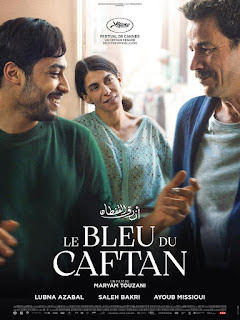The Blue Caftan - Fabric On Naked Skin
Thoughts On: The Blue Caftan (أزرق القفطان , 2022)
Made by Maryam Touzani, this is the Moroccan film of the series.
Absolutely phenomenal. As simple as it is challenging as it is profound, The Blue Caftan is unspeakably affective, utilising uncomfortably intimate cinematography to lull you within the breath of a traditional tailor and his wife's complex married life as it reaches its conclusion. A passionate tale of noble love reflected by a shadow of perverse discretion, The Blue Caftan deals with a wife and her secretly gay husband. As a Moroccan film, shot in Salè Madina by Maryam Touzani, this can be considered highly transgressive; homosexual sexual activity being illegal, punishable by imprisonment and fines in Morocco. But as transgressive as Touzani's cinema is, her previous films dealing with other difficult subjects such as prostitution and exploitation, her cinematic influences are overtly sincere; she has cited Chaplin, Ozu, De Sica and Bergman as directors of her favourite films, and you can feel their presence over her cinema distinctly - some of the highest praise I can give The Blue Caftan.
Confronting the deeply taboo subject of homosexuality in Moroccan culture, Touzani retains compassion while projecting the taboo within dark and hellish corners to sustain its cultural air of danger, fear, perversion and anxiety. The intimacy with which this is done rips at the skin at points for how palpable the capricious drama is in its capturing of a man who is profoundly loving and yet inextricably detached from himself, his culture and, by extension, his soul mate. While the drama of The Blue Caftan waves over the skin causing shudders it also manages to weave in between your ribs with the presentation of beautifully traditional craftmanship; a passion for life as a beautiful façade. Two-sidedness rings through the life of this married couple, and though it shakes the two undeniably, in their strength they seem to resonate together, producing angelic music. For despite his life crumbling, his denial of self, his restriction and twisted indulgence in his suppressed shadow, the slow demise of his business and trade, and the cancer taking his wife, the husband always makes time to make his wife laugh. Not once do we doubt his love for her, and likewise her love for him, despite the polarity and secrets. Their lives become, as the titular metaphor comes to be, like an elegantly detailed garment. With acceptance of the fact that every piece of fabric has its two sides, one to touch the skin, the other to disguise it, the married couple come to master and perfect the adornment of their outer selves, that which disguises, but upholds and graces who they truly are, and yet simultaneously cultivate a passion for the inner-self that meets the bare skin. And such a symbolic means of perceiving the duality of our couples' lives that sees opposing personas battle within two souls seeking peace evokes the most in the final scenes in which, breaking tradition, the wife's funeral procession sees her wear the husband's finest work instead of plain white. The husband's final expression to his wife is one that would have made her laugh and smile despite silencing and alienating his social milieu; his most sacred dedication, his greatest and purest strength being his ability to produce the symbolic Blue Caftan, a fabric disguising naked skin, for his wife.










